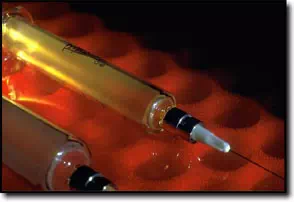 Nevada Nevada
Medical Waste
Definition of Infectious Medical Waste
Managing Infectious Medical Wastes
OSHA Regulations
Contacts
Statutes, Regulations and Guidelines
More Information
Definition of
Medical Waste
Nevada has adopted
the US Dept. Of Transportation definition for regulated medical
waste found in (49
CFR Part 173). Regulated medical waste means a waste
or reusable material known to contain or suspected of containing
an infectious substance in Risk Group 2 or 3 and generated in the
diagnosis, treatment, or immunization of human beings or animals;
research on the diagnosis, treatment or immunization of human beings
or animals; or the production or testing of biological products. Where, Risk
group means a ranking of a micro-organism's ability to cause
injury through disease. A risk group is defined by criteria
developed by the World Health Organization (WHO) based on the severity
of the disease caused by the organism, the mode and relative ease
of transmission, the degree of risk to both an individual and a
community, and the reversibility of the disease through the availability
of known and effective preventative agents and treatment.
Managing
Medical Wastes
Nevada Division
of Environmental Protection states that if medical waste has been
treated by incineration, autoclaving or an alternative method approved
by the solid waste management authority, it can be managed as ordinary
solid waste with no special requirements. Special requirements
apply to the storage, collection, labeling, transporting and disposal
of regulated medical waste. Nevada regulations allow the direct
disposal by landfilling of untreated medical waste.
There are services
throughout the state for the collection and disposal of medical
waste generated in healthcare and veterinary facilities. Services
for home-generated medical waste sharps are not prevalent, however.
According to
the Nevada Division of Environmental Protection, there are two
basic ways of managing medical waste that can protect workers and
the public from disease transmission: 1) treatment to render the
waste non-infectious, or 2) segregation to prevent exposure. Nevada
regulations do not require treatment of medical waste. Disposal
in a permitted landfill according to approved practices is acceptable. However,
until the waste had been either treated or disposed, it must be
stored and collected according to the requirements of Nevada Administrative
Code (NAC) 444.662. The US Occupational Safety and Health Administration
(OSHA) has adopted regulations to limit workers' occupational exposure
to blood and other body fluids which may pose a risk of infection
by bloodborne pathogens. These rules are discussed below.
Storage, Collection
and Disposal Regulations
The Nevada Administrative
Code (NAC) contains the following regulations concerning the storage,
collection, and disposal of medical waste:
- Medical wastes must be
stored in watertight, tightly covered and clearly labeled containers
that are resistant to corrosion and are in a safe location, inaccessible
to the public.
- Medical wastes must not
be deposited in containers with other solid wastes.
- Medical wastes must be
transported separately from other solid wastes to an approved
disposal site and handled in accordance with a method approved
by the solid waste management authority.
- Medical wastes may be
deposited at a disposal site only if provisions for such disposal
are included in the operational plan and approved by the solid
waste management authority.
OSHA Regulations
In addition to the state medical waste environmental
regulations there are some Occupational Safety and Health Administration
(OSHA) rules that apply to medical/infectious waste. Nevada is
one of 24 states operating an approved occupational safety and
health program. This program is operated by the Occupational Safety and Health Administration. OSHA
rules (Occupational Exposure to Bloodborne Pathogens Standards)
impact various aspects of medical/infectious waste, including management
of sharps, requirements for containers that hold or store medical/infectious
waste, labeling of medical/infectious waste bags/containers, and
employee training. These requirements can be found in the VetCA
section entitled OSHA Standards for
Regulated Waste.
Statutes, Regulations
and Guidelines
Nevada
Administrative Code Chapter 444 Containing NAC 444.570 to 444.7499
Solid Waste Disposal
Contacts
State of
Nevada Department of Conservation and Natural Resources
Division
of Environmental Protection
NDEP
Solid Waste Branch (General) 775-687-9462
NDEP
Solid Waste Branch (RMW contact - Les Gould) 775-687-9468
Nevada
State Health Division
Occupational
Safety and Health Administration
Clark County Health District (702) 383-1275
Washoe County District Health Department
(775) 328-2434
Nevada Division of Industrial Relations,
Safety Consultation and Training Section (775) 688-1474 (for information concerning
OSHA Boodborne Pathogens rule)
More Information
Nevada's Solid
Waste Management Plan
Solid Waste Fact Sheet: Collection
and Disposal of Medical Waste
Nevada Division of Environmental Protection:
Management of Medical Waste
|

